第6章
"Do you belong to the recruits from Fougeres?"To this inquiry Marche-a-Terre replied by the bucolic "I don't know,"the hopeless imbecility of which puts an end to all inquiry.He seated himself by the roadside, drew from his smock a few pieces of thin, black buckwheat-bread,--a national delicacy, the dismal delights of which none but a Breton can understand,--and began to eat with stolid indifference.There seemed such a total absence of all human intelligence about the man that the officers compared him in turn to the cattle browsing in the valley pastures, to the savages of America, or the aboriginal inhabitants of the Cape of Good Hope.Deceived by his behavior, the commandant himself was about to turn a deaf ear to his own misgivings, when, casting a last prudence glance on the man whom he had taken for the herald of an approaching carnage, he suddenly noticed that the hair, the smock, and the goatskin leggings of the stranger were full of thorns, scraps of leaves, and bits of trees and bushes, as though this Chouan had lately made his way for a long distance through thickets and underbrush.Hulot looked significantly at his adjutant Gerard who stood beside him, pressed his hand firmly, and said in a low voice: "We came for wool, but we shall go back sheared."The officers looked at each other silently in astonishment.
It is necessary here to make a digression, or the fears of the commandant will not be intelligible to those stay-at-home persons who are in the habit of doubting everything because they have seen nothing, and who might therefore deny the existence of Marche-a-Terre and the peasantry of the West, whose conduct, in the times we are speaking of, was often sublime.
The word "gars" pronounced "ga" is a relic of the Celtic language.It has passed from low Breton into French, and the word in our present speech has more ancient associations than any other.The "gais" was the principal weapon of the Gauls; "gaisde" meant armed; "gais"courage; "gas," force.The word has an analogy with the Latin word "vir" man, the root of "virtus" strength, courage.The present dissertation is excusable as of national interest; besides, it may help to restore the use of such words as: "gars, garcon, garconette, garce, garcette," now discarded from our speech as unseemly; whereas their origin is so warlike that we shall use them from time to time in the course of this history."She is a famous 'garce'!" was a compliment little understood by Madame de Stael when it was paid to her in a little village of La Vendee, where she spent a few days of her exile.
Brittany is the region in all France where the manners and customs of the Gauls have left their strongest imprint.That portion of the province where, even to our own times, the savage life and superstitious ideas of our rude ancestors still continue--if we may use the word--rampant, is called "the country of the Gars." When a canton (or district) is inhabited by a number of half-savages like the one who has just appeared upon the scene, the inhabitants call them "the Gars of such or such a parish." This classic name is a reward for the fidelity with which they struggle to preserve the traditions of the language and manners of their Gaelic ancestors; their lives show to this day many remarkable and deeply embedded vestiges of the beliefs and superstitious practices of those ancient times.Feudal customs are still maintained.Antiquaries find Druidic monuments still standing.The genius of modern civilization shrinks from forcing its way through those impenetrable primordial forests.An unheard-of ferociousness, a brutal obstinacy, but also a regard for the sanctity of an oath; a complete ignoring of our laws, our customs, our dress, our modern coins, our language, but withal a patriarchal simplicity and virtues that are heroic,--unite in keeping the inhabitants of this region more impoverished as to all intellectual knowledge than the Redskins, but also as proud, as crafty, and as enduring as they.The position which Brittany occupies in the centre of Europe makes it more interesting to observe than Canada.Surrounded by light whose beneficent warmth never reaches it, this region is like a frozen coal left black in the middle of a glowing fire.The efforts made by several noble minds to win this glorious part of France, so rich in neglected treasures, to social life and to prosperity have all, even when sustained by government, come to nought against the inflexibility of a population given over to the habits of immemorial routine.This unfortunate condition is partly accounted for by the nature of the land, broken by ravines, mountain torrents, lakes, and marshes, and bristling with hedges or earth-works which make a sort of citadel of every field; without roads, without canals, and at the mercy of prejudices which scorn our modern agriculture.These will further be shown with all their dangers in our present history.